Key takeaways:
- Wildlife conservation NGOs educate communities on the importance of biodiversity, fostering local empowerment and engagement.
- Volunteering offers diverse opportunities, allowing individuals to contribute personal skills to conservation efforts, creating a sense of belonging and responsibility.
- Building long-term relationships with NGOs enhances collaboration and deepens personal commitment to conservation goals.
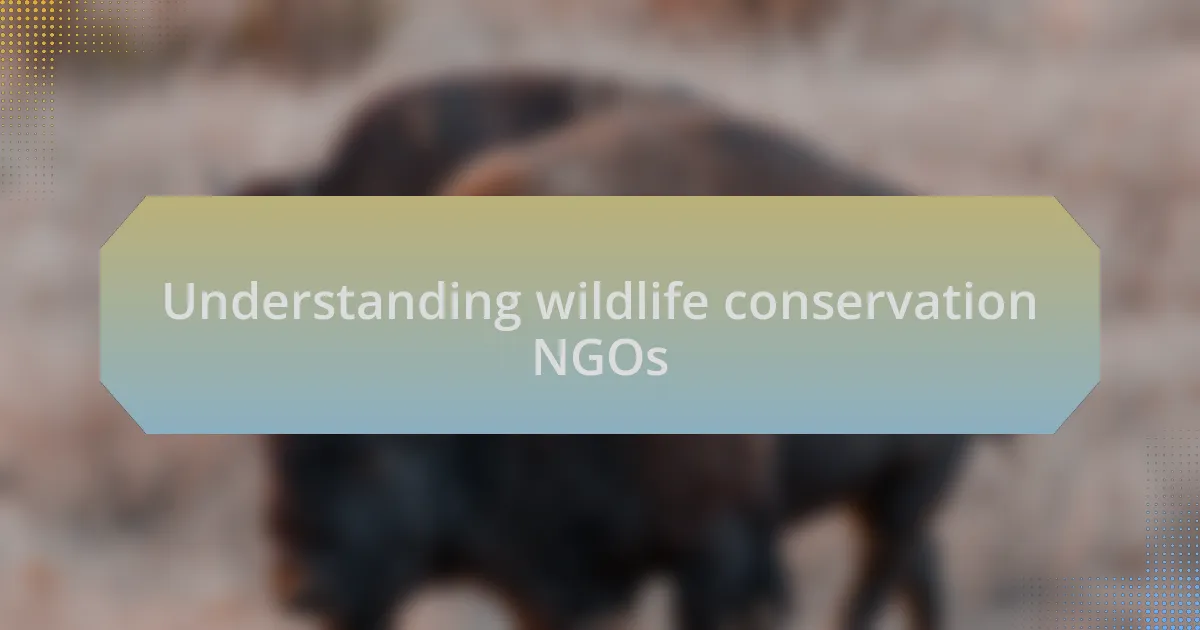
Understanding wildlife conservation NGOs
Wildlife conservation NGOs play a crucial role in protecting our planet’s biodiversity. I remember attending a local event organized by one such NGO; standing amidst passionate activists, I felt a palpable sense of urgency in their mission. It made me question, what would the world look like if these organizations didn’t exist?
These organizations often bridge the gap between science and the community, educating people on the importance of wildlife conservation. I’ve seen firsthand how their grassroots initiatives can empower locals to change their attitudes towards endangered species. Have you ever considered how much an informed community can impact conservation efforts?
Through their advocacy, these NGOs highlight the interconnectedness of ecosystems and the vital role each species plays. I often reflect on a documentary that moved me deeply, showcasing the balance of life and the efforts of these NGOs in action. It’s inspiring to realize that every small contribution to conservation, whether financial or through volunteering, can lead to significant changes.
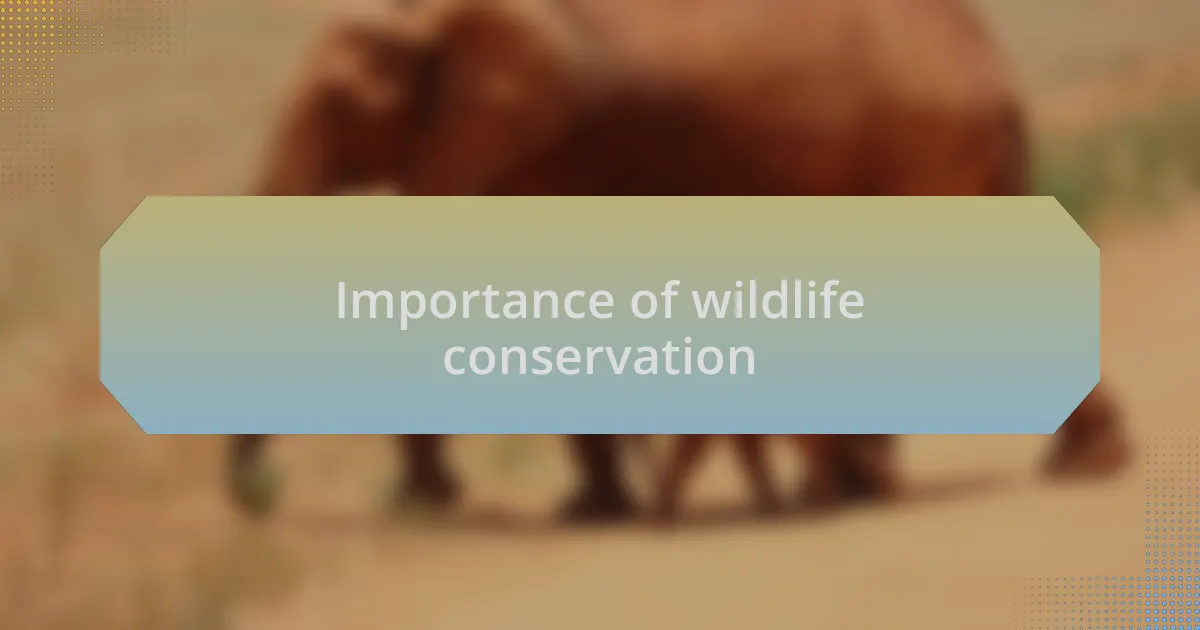
Importance of wildlife conservation
Wildlife conservation holds immense importance, as it directly impacts the health of our planet. I recall a hike I took in a protected area where I marveled at the diversity of life surrounding me. This experience reinforced my belief that every species, no matter how small, plays a pivotal role in maintaining ecological balance; losing one could disrupt the entire system.
Moreover, conserving wildlife is integral to our own survival. I once chatted with a biologist who explained how certain species contribute to pollination and pest control, which ultimately affects our food sources. It made me ponder—how much do we take for granted in our daily lives without realizing the delicate ecosystem that supports us?
Additionally, engaging in wildlife conservation nurtures a profound sense of responsibility towards our environment. I remember volunteering at a local sanctuary and the overwhelming feeling of unity among the team. Seeing everyone driven by a common purpose to protect these majestic creatures ignited my passion for conservation, highlighting the idea that we are all stewards of the earth. How can we ignore our duty to preserve the natural world for future generations?
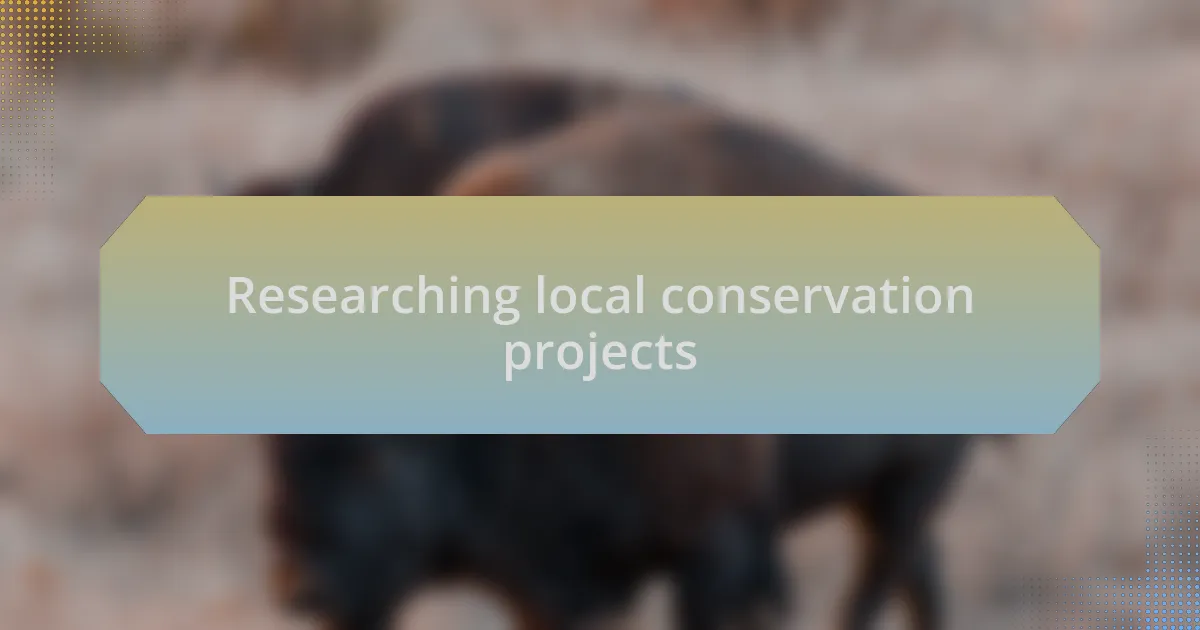
Researching local conservation projects
When I set out to connect with local conservation projects, I found that research was my best friend. I began by exploring online databases, searching for NGOs in my area. It was both exciting and overwhelming—there are so many organizations dedicated to different aspects of conservation! I often asked myself, which cause resonates with me the most?
Diving deeper, I discovered that many projects offer opportunities for volunteers who want to make a difference. I remember reading about a community-led initiative focused on restoring native habitats. The passion these volunteers had ignited something in me—I realized I could be a part of something bigger. It made me wonder, how often do we pass by potential opportunities to contribute to our planet’s health?
I also took advantage of social media to follow these organizations and engage in real conversations. Connecting with like-minded individuals helped me understand their experiences and challenges. This connection brought a personal touch to the research process; I wasn’t just reading about conservation efforts—I was immersed in a community fighting for the same cause. Isn’t it incredible how a simple online search can transform our relationship with the world around us?
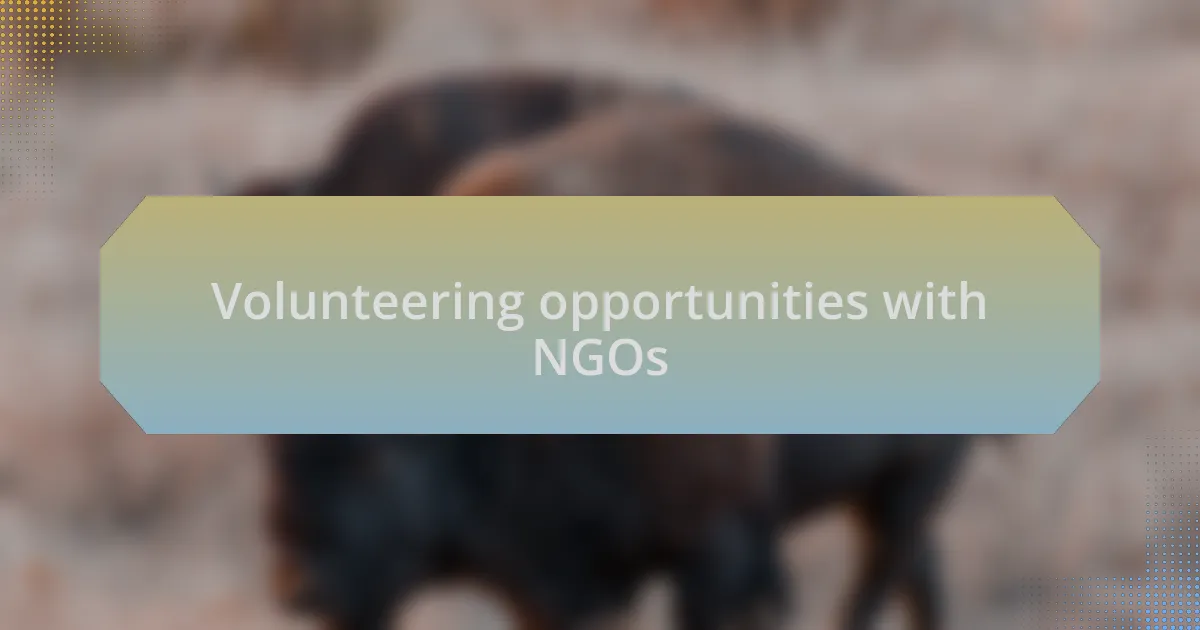
Volunteering opportunities with NGOs
As I explored volunteering opportunities with NGOs, I quickly learned that there are various ways to contribute based on my skills and interests. I remember initially hesitating, thinking I needed extensive qualifications for meaningful involvement. However, many organizations welcomed volunteers of all backgrounds, allowing me to connect my personal skills, like social media management, with wildlife education programs. What if I hadn’t taken that step?
One experience I cherish was working with a local NGO during their annual community cleanup. It was eye-opening to see how a weekend spent picking up litter could have a profound impact, not just on the environment but on the community’s spirit. Surrounded by passionate individuals, I felt an overwhelming sense of belonging. That day, I understood that volunteering isn’t just about the tasks at hand; it fosters a deep connection and responsibility toward the ecosystems we aim to protect.
Looking for volunteer gigs energized me in ways I hadn’t anticipated. I stumbled upon opportunities that ranged from hands-on fieldwork to virtual advocacy campaigns. One moment stands out vividly: I participated in a virtual seminar where experts shared their journeys. Hearing their stories empowered me, and I realized that volunteering, regardless of location, creates pathways for learning and advocacy. Isn’t it fascinating how each opportunity shapes not just our understanding of conservation but also our role within it?
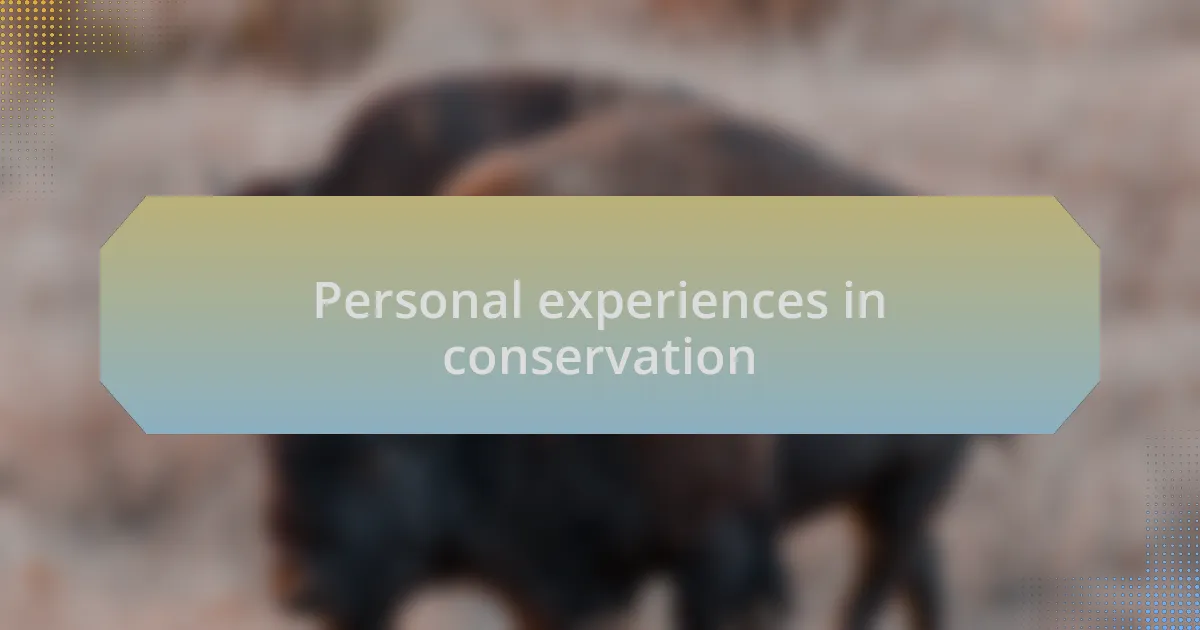
Personal experiences in conservation
One of my most memorable experiences in conservation was a trip to a wildlife refuge, where I assisted in rehabilitating injured birds. I vividly remember the moment I held a young eagle that had fallen from its nest; its piercing gaze challenged me to reflect on the fragility of life. It struck me then that the work we do goes beyond just saving animals—it’s about restoring hope and resilience in the natural world. Have you ever felt the weight of responsibility in such a moment?
Another powerful experience came when I joined a community workshop focused on sustainable practices. I was surprised by how engaged locals were, sharing their stories of balancing tradition and conservation. Listening to their passion reminded me that conservation is not just a scientific endeavor—it’s a shared journey where cultural wisdom and modern strategies intertwine. This blend of perspectives ignited my desire to advocate for solutions that respect both nature and local lifestyles.
During my time with a coastal NGO, I participated in a project aimed at reducing plastic waste on our beaches. The camaraderie among volunteers was infectious; we were all united by the common goal of protecting our ocean. As I collected debris with others who resonated deeply with the cause, I found joy in the smallest victories—like discovering a newly cleaned stretch of sand. It made me wonder: how many such small contributions add up to create significant change?
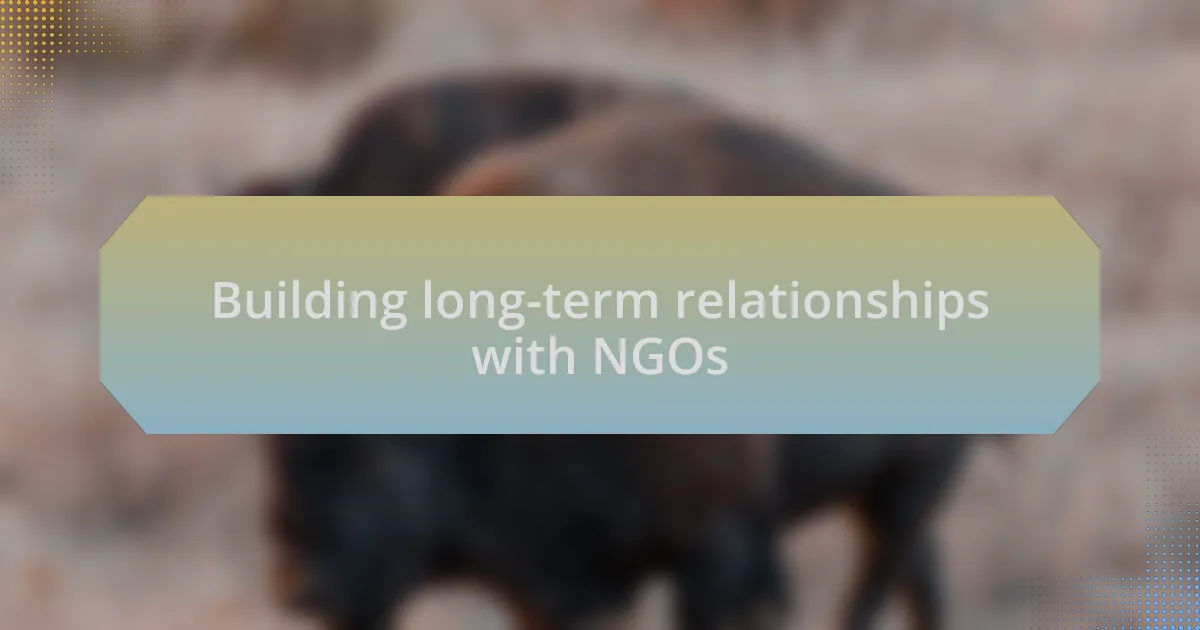
Building long-term relationships with NGOs
Building long-term relationships with NGOs requires trust and consistent engagement. I recall my early days volunteering with a wildlife NGO, where I quickly learned that regular communication was key. Each meeting or event became an opportunity not just to contribute, but to understand their mission on a deeper level. Have you ever thought about how shared goals enhance collaboration?
I remember a conversation with a project manager who shared her struggles in maintaining funding. Her transparency opened a new level of connection for me. We brainstormed fundraising ideas together; that moment of collaboration made me feel more invested in the cause. It’s these personal exchanges that transform a simple volunteer role into a meaningful partnership.
Participating in long-term initiatives cultivates a sense of belonging. For instance, I found myself leading a series of workshops for local schools, centered on wildlife conservation. The relationships I built with both the NGO team and the students deepened my commitment to their cause. It made me realize: when we connect on a personal level, we not only support wildlife but also foster a community dedicated to change.